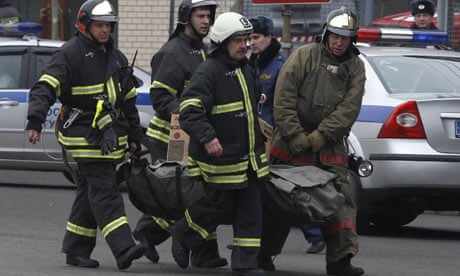I am not there at the moment, but I actually live next to the Park Kultury underground station where the second Moscow blast happened. This is "my" station, and I use it every time I need to go anywhere except the nearest shop. And every time, once inside, I think what a perfect target Moscow underground is for a terrorist attack.
People are packed in the trains and in the stations like sardines in a can, ventilation is bad, and the capacity of exit escalators inadequate, each collecting a dense crowd in front of it. It is impossible to make it secure – and despite this, everybody uses it, because it is the most reliable and fastest transport in Moscow. Obviously, this thought did not occur to me alone. Monday's was the fifth terrorist attack in the Moscow underground. Well, today I was not there. Next time, I could be.
There is no doubt that the choice of stations for an attack this time was a challenge – a gauntlet on the ground. Lubyanka's name speaks for itself – it is right next to the FSB (Federal Security Service) building, the former headquarters of the KGB and its main prison, known to everyone as exactly this – Lubyanka. Park Kultury is next to the defence ministry, MV Frunze military academy and several other military institutions. Many high-ranking officers live there, too. Both stations are right at the heart of Moscow, in its prestigious, elite areas.
The first reaction of Muscovites to this challenge is, of course, anger.
Against whom? Mostly against the Chechens and other inhabitants of the North Caucasus: even though no perpetrators have been caught, and clues as to who committed the crime have yet to emerge, it has already been announced that there is a North Caucasian connection. A neighbour was shouting hysterically over the phone to me: "Poison these bloody Chechens like vermin, instead of showering money on them!" Another said: "Get them all out of Moscow. Close the city, then it will be safe and clean."
The second reaction is gratitude to the security services, who are said to have reacted swiftly and efficiently, and to the prime minister. And some political commentators are already denouncing the west: it is the west, it is said, that instigates anti-Russian sentiment in the North Caucasus by elevating North Caucasian terrorists to the status of freedom fighters and giving them assistance and shelter.
So this may be an indicator of the shape of things to come. More xenophobia on the part of the population, which would make any effort by human rights campaigners in the Caucasus even more difficult. More attacks on minorities: Caucasians and other non-Russians in Russian cities and towns. Tighter security measures at every possible turn. More police patrols checking ID documents of every dark-haired passerby. A tighter squeeze on the remnants of independent media and NGOs. Tighter control over the use of the internet, and more surveillance of individual citizens. And certainly, a new upsurge in the popularity ratings of the prime minister, which had started to sag a bit in recent months.
Will all this make Moscow underground safer? Absolutely not.
